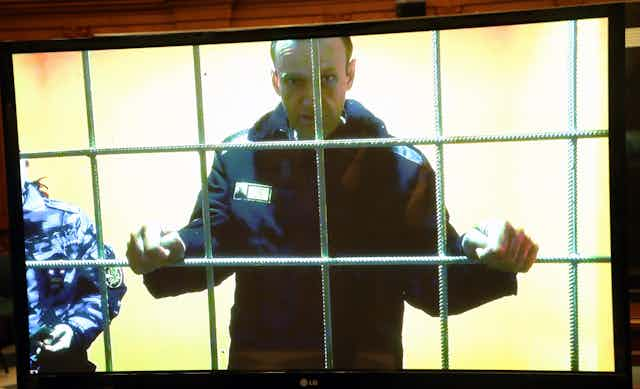There is growing concern about Russian opposition leader Alexei Navalny who is reported to have disappeared from the Russian prison colony in which he has been serving a lengthy sentence. Lawyers for the 47-year-old dissident said he had last been in contact two weeks ago.
Navalny’s imprisonment has been condemned by human rights organisations as “politically motivated” and he was due to face fresh charges. But it was announced on Monday that seven criminal proceedings that were pending had been put on hold. This has fuelled fears about his whereabouts and also his health, which has reportedly deteriorated due to the conditions in which he was being held.
There has been speculation that he may have been transferred to a harsher prison. Dmitry Peskov, press secretary to Russian president Vladimir Putin, declined to comment, saying he had “neither the intention nor the ability to track the fate of prisoners”.
Nalvany’s apparent disappearance comes as Putin has launched his campaign for a fifth term of office. Elections scheduled for March 2024 are generally thought to be no more than a formality, given the lack of any real opposition.
Silencing dissent
The Russian government has penetrated, intimidated, or silenced most opposition inside Russia. It accomplishes this through a spectrum of methods that ramp up depending on the type of activity and the prominence of the opposition leader. The severity of opposition action determines the intensity of response.
How the Putin government deals with its opponents

If anyone in Russia criticises the Putin regime – either online or in person – the Federal Security Service (FSB), Russia’s powerful internal security agency, can initiate human or technical monitoring. Human monitoring involves the FSB recruiting a person and instructing them to become acquainted with a suspect, listen to their conversations, and initiate opposition-themed discussion to draw out the suspect’s reactions.
The FSB has several options if a person takes the bait and expresses agreement with the anti-government provocation. It can approach the person and recruit them as a source to report on colleagues, often using the threat of arrest as incentive. It can invite them to a “prophylactic” conversation, informing them that the FSB is aware of their activity and recommends they cease before they get into real trouble. Or the FSB can arrest them and hold them briefly to frighten them into stopping their oppositionist speech. In lower-level cases, the goal is to disrupt the activity before it becomes dangerous.
In combination with human operations, the FSB also has legal access to Russian internet and voice communications to monitor conversations, determine the intensity of oppositionist speech, and identify group leaders. Communication intercepts are allowed in Russia with a formal court order.
But the wide spectrum of criminal violations that the FSB is responsible for investigating – from economic and fraud laws to terrorism laws – and the broad latitude the FSB enjoys in interpreting those laws, makes it easy to find a reason to justify a communication intercept warrant. The expansion of laws prohibiting anti-war rhetoric since the Russian invasion of Ukraine makes it even easier.
Harsh treatment
The next level of intensity involves a person joining and actively participating in an opposition movement, such as in anti-regime demonstrations or publications. In such cases, like those that occurred in February and March 2022, the FSB can arrest or physically restrain participants, with support from the Russian National Guard, and charge the organisers with a spectrum of crimes. These can range from terrorism and extremism to treason.
Becoming an opposition figurehead and gaining a following that potentially rivals Putin is the highest form of anti-regime activity and prompts the most intense response. That most often means long jail sentences. Anti-Putin politician Vladimir Kara-Murza was arrested in April 2022 and charged with treason in August 2023. He’s now serving 25 years in prison.

Navalny, who has continued to criticise Putin even from prison, was charged with terrorism in October 2022, which will probably keep him in prison for life – however long that turns out to be, given recent reports of his ill-health and the conditions in which he is held.
Ultimate sanction
Beyond long jail sentences, a few select opposition figures warrant the highest form of punishment: assassination. This comes when other methods of persuasion and intimidation fail and an opposition leader becomes a symbol.
Boris Nemtsov, Navalny’s and Kara-Murza’s political partner, died under suspicious circumstances in February 2015. He had been arrested for anti-Putin speech in 2007, 2010 and 2011, before being shot dead in Moscow. Kara-Murza survived two suspected poisonings, in 2015 and in 2017.
Navalny was targeted for assassination in 2020 when the FSB reportedly tried to poison him using the chemical weapon Novichok. The investigative journalist organisation Bellingcat assessed that Kara-Murza and Navalny had been under investigation for years and the same FSB element had been tailing both of them.
But assassination is a last resort for suppressing opposition because of the prospect that an individual could become a martyr – even more popular in death than in life. A long prison sentence allows an opposition leader to remain a symbol of defeat for the Russian population to see.
Navalny’s apparent disappearance is probably the result of his continued ability to make anti-regime statements from prison. Some western media reports have speculated that he has been murdered. But it is more likely he has been transferred to another prison where his ability to communicate with the outside world is more firmly controlled.
Former Wagner Group boss, Yevgeny Prigozhin, who became prominent for his criticism of the Russian military’s handling of the war in Ukraine, went a step further and turned his company’s military power on Moscow. His sudden death in an airplane crash in August 2023, possibly caused by an anti-aircraft missile, is not surprising in the context of the intensity scale.

